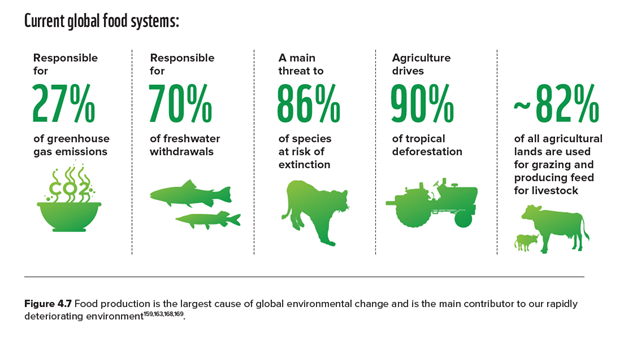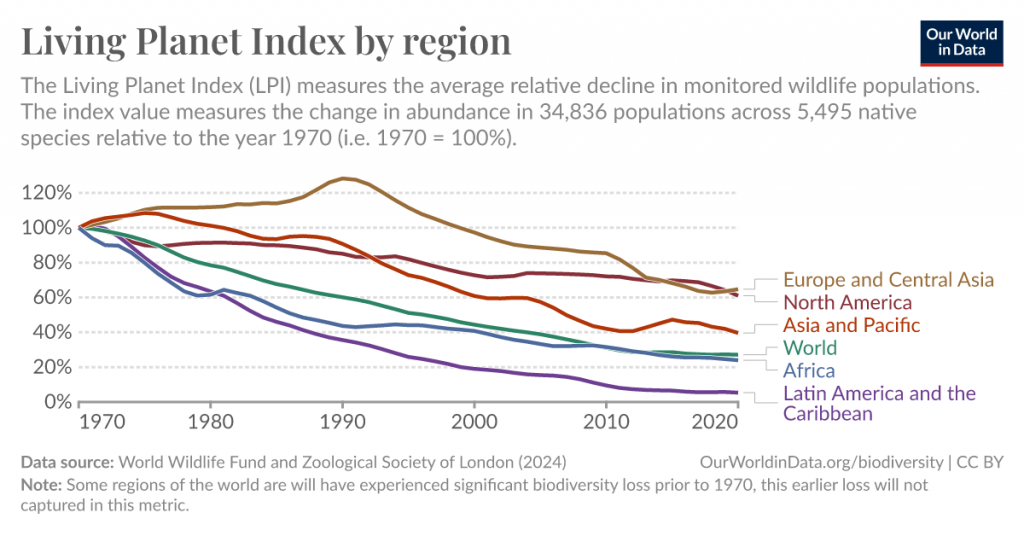Resetting Our Relations with the Earth
Oct 29th, 2024 | By admin | Category: Biodiversity/ConservationBy Suzanne York.
This year is likely to be the planet’s warmest one on record, just beating 2023 as the hottest since at least the 19th century. Next month the climate negotiations will kick off in oil-rich Azerbaijan, following last year’s talks in oil-rich Dubai.
The United Nations states humanity is currently on track to see between 2.6 and 3.1 degrees Celsius of global warming this century. The U.N. said current polices are so off course that there is zero chance for the world to limit global warming to the 1.5C limit agreed to during the Paris climate agreement in 2015.
Happening now, however, is another critical global gathering on the state of the world’s biodiversity. The Conference of the Parties (COP) to the Convention on Biological Diversity (CBD) is taking place in Colombia, and delegates and participants are working on plans to stop habitat loss and save endangered species.
At the opening of the COP, Secretary-General Antonio Guterres said, “The framework is grounded in a clear truth – for humanity to survive, nature must flourish…it promises to reset relations with Earth and its ecosystems.”
A Living Planet in Dire Straights
A reset is clearly needed. The annual Living Planet Report was released just ahead of the start of the CBD conference in Colombia. The analysis by World Wildlife Fund and Zoological Society of London found that global wildlife populations have plunged by an average of 73% in 50 years. The steepest declines were in Latin America and the Caribbean.
The index assessed the likely global tipping points to appear soon, from die off of corals from bleaching, melting of the Greenland and West Antarctic ice sheets and large-scale thawing of permafrost.
The report noted that in the natural world, “a number of tipping points are highly likely if current trends are left to continue, with potentially catastrophic consequences.”
COP President Susana Muhamad, who is also Colombia’s environmental minister, said “The world is witnessing the mass bleaching of coral reefs, the loss of tropical forests, the collapse of polar ice caps and serious changes to the water cycle, the foundation of life on our planet.”
An Increasingly Dire Situation
Efforts to formulate an effective plan to ‘save’ biodiversity is taking place in a country where the risks are, or should be, front and center.
Scientists have warned Colombia is at risk of rapid environmental decline. Deforestation has jumped 40% in the first three months of this year, according to government data, despite gains reported last year. Droughts have also been hitting cities such as Bogotá hard, which is experiencing its worst drought since 1995 and is implementing strict water rationing measures.
And just when environmentalists are needed most, Global Witness found Colombia is now the world’s most dangerous place for them, with 79 killed last year, the most ever in one country in a single year.
Looking Ahead
COP President Muhamad emphasized the links between biodiversity conservation and climate action, and that extractive use of natural resources is responsible for 50 per cent of greenhouse gas emissions today, but at the same time, it is also causing 90 per cent of biodiversity loss.
Encouragingly, the Living Planet report and many COP participants understand the important role indigenous people play in protecting the planet. From the report:
Supporting the rights of Indigenous Peoples and local communities may be one of the most effective ways to conserve biodiversity at scale. A quarter of the global land area is traditionally owned, managed, used and/or occupied by Indigenous Peoples, which includes about 35% of the area formally in protected areas and 35% of the remaining intact terrestrial areas.
Read this article in MongaBay for an overview of what Indigenous delegates would like to see happen at COP – What Indigenous leaders want from the COP16 U.N. biodiversity conference.
Our global backs are against the wall. Living Planet calls for “nothing less than a transformation of our food, energy and finance systems” and states “We have five years to place the world on a sustainable trajectory before negative feedbacks of combined nature degradation and climate change place us on the downhill slope of runaway tipping points.”
Our relationship with Earth is badly out of balance. We need to transform our attitude to be one of respect for nature. If we don’t alter our relationship, any change will be limited and too little, too late. There’s too much at stake to not put everything we have into changing course.
Suzanne York is Director of Transition Earth.

![[Photo: Photo by Dylan Shaw, Unsplash]](http://populationgrowth.org/wp-content/uploads/2024/10/dylan-shaw-PhACKHyklRg-unsplash-300x200.jpg)

